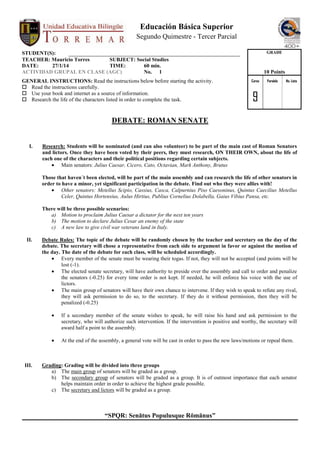
Roman Senate Debate
- 1. Educación Básica Superior Segundo Quimestre - Tercer Parcial GRADE STUDENT(S): TEACHER: Mauricio Torres SUBJECT: Social Studies DATE: 27/1/14 TIME: 60 min. ACTIVIDAD GRUPAL EN CLASE (AGC) No. 1 GENERAL INSTRUCTIONS: Read the instructions below before starting the activity. Read the instructions carefully. Use your book and internet as a source of information. Research the life of the characters listed in order to complete the task. 10 Points Curso Paralelo No. Lista 9 DEBATE: ROMAN SENATE I. Research: Students will be nominated (and can also volunteer) to be part of the main cast of Roman Senators and lictors. Once they have been voted by their peers, they must research, ON THEIR OWN, about the life of each one of the characters and their political positions regarding certain subjects. Main senators: Julius Caesar, Cicero, Cato, Octavian, Mark Anthony, Brutus Those that haven´t been elected, will be part of the main assembly and can research the life of other senators in order to have a minor, yet significant participation in the debate. Find out who they were allies with! Other senators: Metellus Scipio, Cassius, Casca, Calpurnius Piso Caesoninus, Quintus Caecilius Metellus Celer, Quintus Hortensius, Aulus Hirtius, Publius Cornelius Dolabella, Gaius Vibius Pansa, etc. There will be three possible scenarios: a) Motion to proclaim Julius Caesar a dictator for the next ten years b) The motion to declare Julius Cesar an enemy of the state c) A new law to give civil war veterans land in Italy. II. Debate Rules: The topic of the debate will be randomly chosen by the teacher and secretary on the day of the debate. The secretary will chose a representative from each side to argument in favor or against the motion of the day. The date of the debate for each class, will be scheduled accordingly. Every member of the senate must be wearing their togas. If not, they will not be accepted (and points will be lost (-1). The elected senate secretary, will have authority to preside over the assembly and call to order and penalize the senators (-0.25) for every time order is not kept. If needed, he will enforce his voice with the use of lictors. The main group of senators will have their own chance to intervene. If they wish to speak to refute any rival, they will ask permission to do so, to the secretary. If they do it without permission, then they will be penalized (-0.25) If a secondary member of the senate wishes to speak, he will raise his hand and ask permission to the secretary, who will authorize such intervention. If the intervention is positive and worthy, the secretary will award half a point to the assembly. At the end of the assembly, a general vote will be cast in order to pass the new laws/motions or repeal them. III. Grading: Grading will be divided into three groups a) The main group of senators will be graded as a group. b) The secondary group of senators will be graded as a group. It is of outmost importance that each senator helps maintain order in order to achieve the highest grade possible. c) The secretary and lictors will be graded as a group. “SPQR: Senātus Populusque Rōmānus”